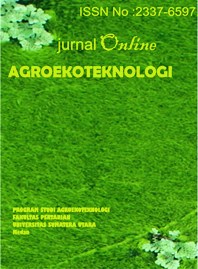Study of Several Soil Properties which Managed Conventionally and by Organic Systems in Naga Timbul Village, Bonatua Lunasi Sub-District of Toba Samosir District```
DOI:
https://doi.org/10.32734/ja.v9i1.6532Abstract
The current agricultural system is generally carried out conventionally depending on the use of chemical fertilizers. But long-term use will have a negative impact because it can acidify the soil. This study's aim was to determine several physical and chemical of soil properties managed by conventional agriculture and organic systems in Naga Timbul Village, Bonatua Subdistrict, Toba Samosir District. The method used was purposive sampling which was carried out compositely on 4 sample points by the zigzag method, 2 points on conventional agricultural land, and 2 points on organic agricultural land, at a depth of 0-20 cm and 20-40 cm. The research started from June to November 2017. The parameters observed were soil physical properties (bulk density, total pore space, and water content) and soil chemical properties (soil pH, organic C, P-available, and P-total). The results showed that the newly managed organic farming system for 3 years had a bulk density value (1.37 g / cm3) 9.67% lower compared to conventional farming systems (1.52 g / cm3); total pore space (48.34%) 11.45% higher compared to conventional farming systems (42.81%); and water content (45.44%) 40.53% higher than conventional farming systems (27.02%). The pH value around (5.13) 3.71% higher compared to conventional agricultural land (4.94); C-Organic (0.55%) 31.25% lower compared to conventional farming systems (0.80%); P-available (25.83 ppm) 28.62% lower compared to the conventional system (36.19 ppm); and the P total value (135.09%) 44.44% lower compared to conventional farming systems (243.15%).
Downloads
Downloads
Published
Issue
Section
License
Copyright (c) 2021 JURNAL AGROEKOTEKNOLOGI

This work is licensed under a Creative Commons Attribution-ShareAlike 4.0 International License.
The Authors submitting a manuscript do so on the understanding that if accepted for publication, copyright of the article shall be assigned to Jurnal Online Agroekoteknologi as well as TALENTA Publisher Universitas Sumatera Utara as the publisher of the journal.
Copyright encompasses exclusive rights to reproduce and deliver the article in all forms and media. The reproduction of any part of this journal, its storage in databases and its transmission by any form or media, will be allowed only with written permission from Jurnal Online Agroekoteknologi.
The Copyright Transfer Form can be downloaded here.
The copyright form should be signed originally and sent to the Editorial Office in the form of original mail or scanned document.











